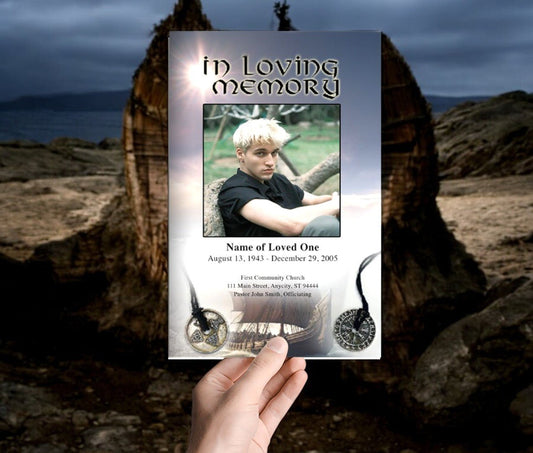How to Select the Right Funeral Poems: A Guide to Choosing Meaningful Tributes

Choosing the right poem for a funeral or memorial service can be a deeply meaningful way to honor a loved one’s life and provide comfort to those who are grieving. Funeral poems capture emotions, convey sentiments, and help express the profound feelings that come with loss. Whether you are planning a traditional funeral, a celebration of life, or a private memorial, selecting a poem that resonates with the deceased's memory and the mourners’ emotions can make a significant impact. This article provides a guide to help you choose the perfect funeral poem that speaks to the heart.
Understanding the Purpose of Funeral Poems
Funeral poems serve several purposes during a funeral or memorial service. They can offer solace to the bereaved, celebrate the life of the deceased, or provide a reflective pause during the service. Before choosing a poem, consider the following:
-
Reflecting the Personality of the Deceased: The poem you choose should reflect the personality, beliefs, or values of the person who has passed away. For example, a poem that captures their humor, kindness, or spirituality can feel more personal and meaningful.
-
Providing Comfort and Hope: Poems that offer messages of hope, peace, and reassurance can be comforting to those in mourning. They can provide a sense of closure and help mourners find peace in their grief.
-
Encouraging Reflection: A well-chosen poem can create a moment of reflection, allowing those present to connect with their emotions, memories, and thoughts about the deceased.
-
Adding a Personal Touch: A poem can serve as a personal touch in a funeral service, offering words that resonate deeply with family and friends, making the service more memorable and meaningful.
Tips for Choosing the Right Funeral Poem
Selecting a funeral poem involves careful consideration of several factors, including the deceased’s personality, the tone of the service, and the preferences of the family. Here are some tips to help you choose the right poem:
- Consider the Tone of the Service
The tone of the funeral or memorial service will often dictate the type of poem that is appropriate. A traditional funeral may call for a more solemn or spiritual poem, while a celebration of life might be better suited to an uplifting or even humorous poem. Consider the overall atmosphere you want to create and select a poem that aligns with that tone.
- Think About the Audience
Consider who will be attending the service and what they might find comforting or meaningful. Some poems may resonate more with close family members, while others may have broader appeal. If the audience is diverse, choose a poem with a universal message of love, hope, or remembrance that everyone can relate to.
- Reflect on the Deceased's Beliefs and Preferences
If the deceased had a favorite poem, author, or a specific type of poetry they loved, it can be very touching to include that in the service. If you know they appreciated a certain style of writing—be it religious, secular, humorous, or contemplative—try to find a poem that aligns with those preferences.
- Choose a Poem That Resonates with You
The poem you select should resonate not only with the audience but also with you. If you are a close family member or friend, choosing a poem that speaks to your relationship with the deceased can add an extra layer of depth and meaning to the service. Personal connection to the poem can make the reading more heartfelt and impactful.
- Consider the Length of the Poem
The length of the poem should fit the structure of the service. Short poems or excerpts can be included in the funeral program or read as part of a eulogy. Longer poems can stand alone as a significant part of the ceremony. Make sure the length is appropriate for the moment in which it will be read.
- Read the Poem Aloud
Before making a final decision, read the poem aloud. Hearing the words spoken can give you a better sense of how they will sound during the service. It can also help you gauge the emotional impact of the poem and determine whether it conveys the right tone and message.
- Choose Poems That Are Easy to Understand
Funeral poems should be accessible and easy to understand, especially in emotionally charged settings. While some poems are deeply profound, those with overly complex language or abstract concepts might not resonate with everyone. Opt for poems with clear, heartfelt messages that are easy to connect with.
Examples of Different Types of Funeral Poems
Here are some examples of different types of funeral poems that might suit various preferences and styles:
-
Traditional and Spiritual Poems
- "The Lord is My Shepherd" (Psalm 23) – A comforting and well-known passage from the Bible often chosen for Christian funerals.
- "Crossing the Bar" by Alfred Lord Tennyson – A poem that reflects on death as a peaceful journey and reunion with God.
-
Uplifting Poems
- "Afterglow" by Helen Lowrie Marshall – A poem that encourages mourners to remember the happy moments shared with the deceased.
- "Miss Me But Let Me Go" by Anonymous – A popular poem that emphasizes celebrating life rather than mourning death.
-
Reflective and Contemplative Poems
- "Do Not Stand at My Grave and Weep" by Mary Elizabeth Frye – A reflective poem that speaks about the eternal presence of the deceased in nature and life.
- "Remember" by Christina Rossetti – A contemplative poem about love, memory, and letting go.
-
Personalized Poems
- Writing a custom poem – For those with a talent for writing or who want something unique, a personalized poem that captures specific memories, traits, or the essence of the loved one can be very meaningful.
How to Write a Custom Funeral Poem
If you are considering writing a custom funeral poem, here are some steps to help you create a meaningful and personal tribute:
-
Reflect on Your Memories: Think about the moments you shared with the deceased, their personality, what made them unique, and how they impacted your life.
-
Decide on the Tone: Choose whether you want the poem to be uplifting, solemn, reflective, or humorous. This will help guide your choice of words and structure.
-
Use Simple, Heartfelt Language: Write from the heart. The most moving poems are often the simplest ones, expressing genuine emotions and thoughts.
-
Include Personal Touches: Mention specific anecdotes, habits, or qualities that capture the spirit of the deceased. This can make the poem feel more intimate and special.
-
Read It Aloud: Like choosing a poem, reading your custom poem aloud can help you refine it and ensure it conveys the right emotions.
How to Select the Right Funeral Poems Conclusion
Selecting the right funeral poem is a thoughtful way to honor a loved one’s memory and provide comfort to those who are grieving. Whether you choose a classic poem, an uplifting piece, a spiritual passage, or decide to write your own, the poem should reflect the essence of the person it is meant to honor. By considering the tone of the service, the audience, and the deceased's personality and beliefs, you can find or create a poem that adds a meaningful and memorable element to the funeral or memorial service.
© The Funeral Program Site













































